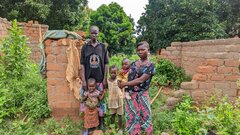The 2024 Global Humanitarian Overview (GHO) requires $48.65 billion to assist 187.8 million people in need across 71 countries through 39 coordinated response plans.
The requirements for the GHO have increased since its launch in December 2023 – from $46.4 billion to $48.6 billion. This increase was due to higher requirements for the Syria Humanitarian Response Plan (HRP), three Flash Appeals for the floods in Libya, droughts in Zambia and Zimbabwe, and a response plan for Burundi to respond to floods.
As of end May 2024, the reported GHO funding amounts to $7.85 billion or 20 per cent less than last year ($9.8 billion) at the same time. The gap between the financial requirements and the resources currently stands at $40.8 billion.
Appeals are funded at an average of 16.1 per cent, compared to 17 per cent at the end of May 2023. More than half of the plans are funded below the global average, with many significantly less. For more details on amount and coverage by plan, see charts below.
Total reported humanitarian funding has reached $11.23 billion, which is a decrease of 19 per cent compared to what was recorded last year at the same time ($13.8 billion).
Appeal Funding Gap (2019 - 2024)
Timely reporting of humanitarian contributions from donors and recipients is crucial to provide reliable and complete data for trend analysis. All partners are encouraged to report funding to the Financial Tracking Service (fts@un.org).
Upcoming Events
The ECOSOC Humanitarian Affairs Segment will take place from 25 to 27 June in New York under the theme “Putting humanity first in the place of conflicts and climate change: Strengthening humanitarian assistance and respect for international humanitarian law, and promoting effectiveness, innovation and partnerships”. Side events will take place from 24 to 28 June.
One side-event will be on “Underfunding and the Cost of Inaction: How to address one of the main challenges to humanitarian response”. It will present the mid-year funding status of the GHO and highlight major funding gaps and the continued increase in humanitarian needs. It will also present a broader picture of the funding landscape in crisis-affected countries, including development funding streams, underscore the cost of inaction on the most vulnerable people in underfunded humanitarian crises, and discuss possible mitigation strategies. The event will take place on Wednesday, 26 June from 13:15-14:30 (New York time).
Another side-event will focus on “Investing in Humanity: Using pooled funds to advance meaningful partnerships for innovations in humanitarian strategies”. Following the themes of ECOSOC HAS this year on innovation, effectiveness and partnerships, the event will feature the CERF Climate Action Account and the Regional Pooled Funds as innovations and will involve women-led and local organisations as crucial leaders and partners. The event will also highlight examples of effectiveness in responding to food insecurity in 2023, preventing famine-like situations as part of anticipatory action/ humanitarian-development collaboration, and solutions related to climate and weather emergencies (e.g., El Niño, drought, etc). The event will take place on Friday, 28 June from 11:30-12:45 (New York time).
For more information on the ECOSOC HAS: 2024 ECOSOC Humanitarian Affairs Segment and ECOSOC Meeting on the Transition from Relief to Development | OCHA (unocha.org)


